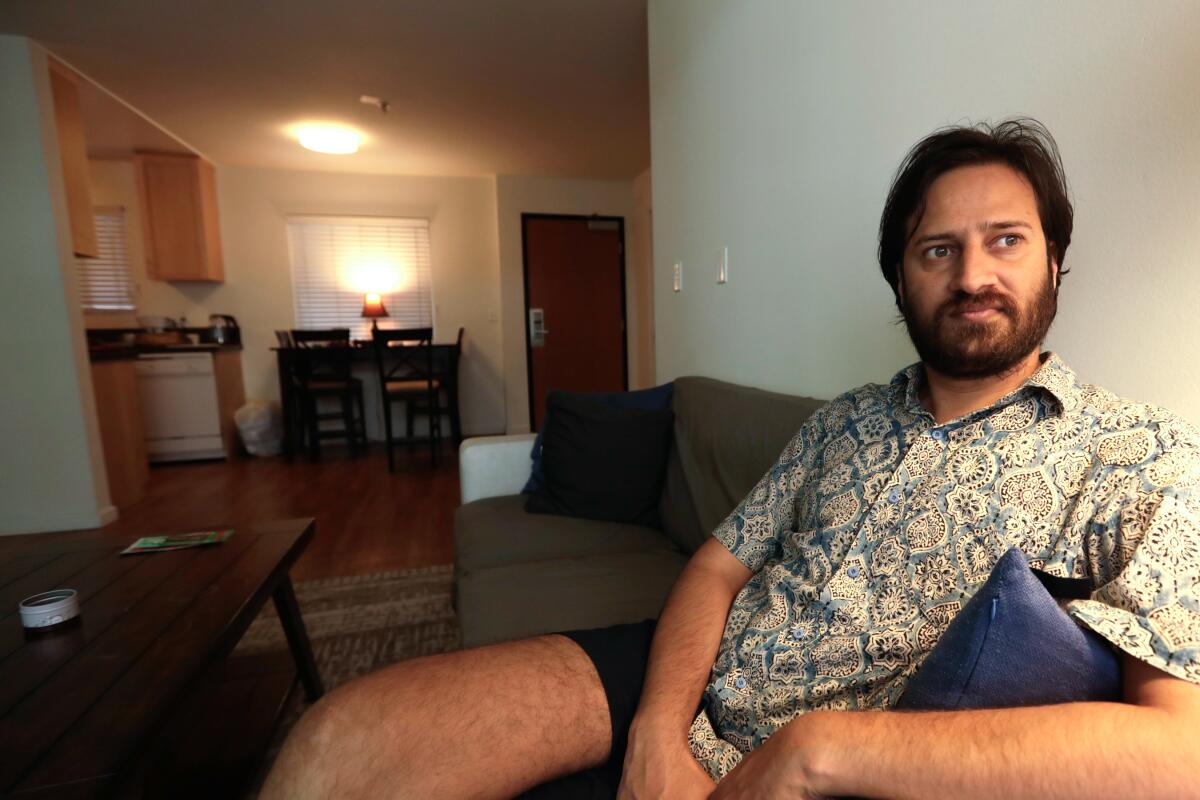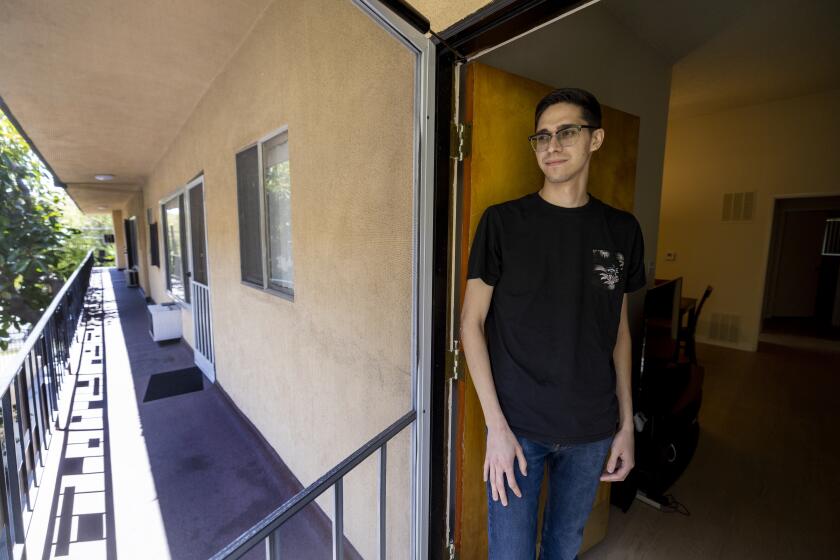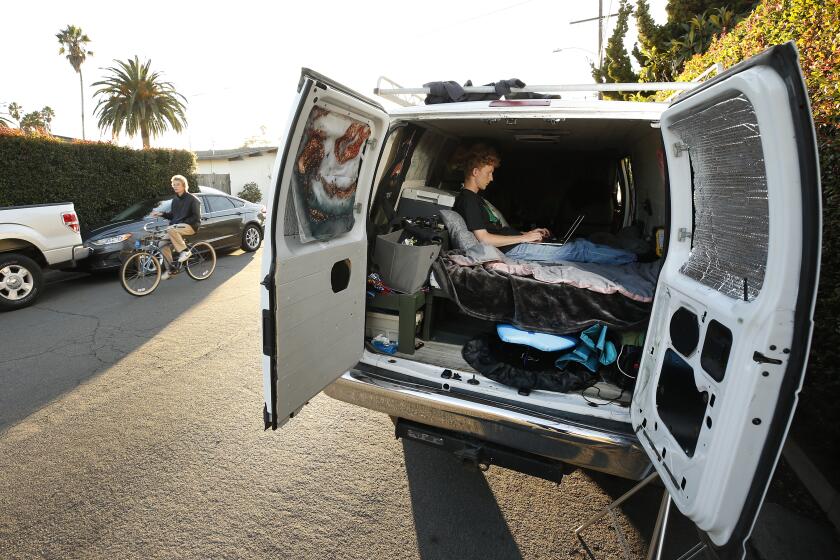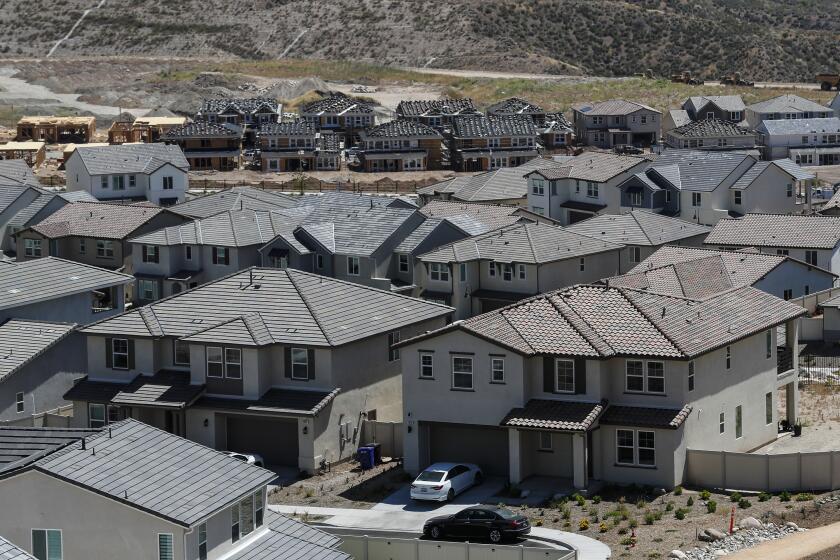Foreign graduate students can’t afford to live in California

- Share via
When Sally Ireri moved to California from Nairobi, Kenya, five years ago, she didn’t expect life to be this difficult. Studying for a doctoral degree in mosquito genetics at UC Riverside, Ireri has had to borrow money and car rides from friends because she makes less than $30,000 a year from teaching.
She lives in a three-bedroom home with two roommates for $750 a month, a rent that’s well-below average for the region but still one that eats up a sizable portion of her paycheck. After she graduates, Ireri wants to remain in California to be at the forefront of research that could assist Kenyans in fighting mosquito-borne diseases.
For the record:
1:04 p.m. June 10, 2022An earlier version of this post identified Rafael Jaime as the head of the UC graduate student union. He is president of UAW 2865, the UC academic student employees union. An earlier version of the post also said that Noubar Afeyan, co-founder of biotechnology company Moderna, is of Lebanese descent. He is of Armenian descent.
But what she’ll need to pay every month to keep a roof over her head is holding her back.
“I don’t know if I can afford to stay here,” said Ireri, 28. “I’ve made a community in the past five years and if I have to leave it’ll be sad.”
The plight of Ireri and other foreign graduate students adds another layer of woes to California’s housing affordability crisis, which has led to the nation’s highest homeless population and burdened millions of tenants with high rents. Foreign students’ difficulties in living in California have broad implications, not only for those who may be hoping to remain here after their degree but the nation’s economic competitiveness as well.
The number of apartments available for rent in L.A. County is the lowest it’s been in two decades. The booming job market isn’t helping.
Immigrants, especially those who come to the United States as students, make up an outsize proportion of start-up entrepreneurs and researchers at the height of their fields, studies have shown, spurring economic growth that is especially pronounced in California and other states with top-tier universities.
“If any substantial fraction of foreign graduate students are deterred from coming and staying in the United States because of housing costs, that is an incalculable loss to state and federal economies,” said Michael Clemens, an economist who studies international migration patterns at the Center for Global Development, a Washington think tank.
Thousands of undergraduates across the state’s public university system are facing mounting housing pressures, with some homeless or living in cars and others burdened by huge debts. For graduate students, the housing squeeze remains considerable.
California’s student-housing crisis has forced hundreds of UC students to live in hotel rooms and vehicles. But campus building efforts have sparked litigation and outcry at campuses, including UC Santa Barbara.
Last fall, the union representing graduate student instructors and teaching assistants within the University of California system surveyed its 19,000 members on how much they were paying for housing. The survey found that on average union members paid more than half their monthly income on rent. Overall, 9 in 10 respondents were rent burdened, meeting the federal definition of paying more than 30% of their income on housing costs.
Similar situations affect graduate students at California’s elite private institutions. Roughly 90% of graduate student workers at both Stanford and USC also are rent burdened, according to reports and students surveys there, and foreigners represent a significant proportion of the population at both schools.

Subscribers get exclusive access to this story
We’re offering L.A. Times subscribers special access to our best journalism. Thank you for your support.
Explore more Subscriber Exclusive content.
Problems with affording a place to live can be especially hard for foreigners, who make up nearly half the members in the UC academic student employee union. In addition to the low pay and high living costs, they have to navigate an unfamiliar housing market while lacking access to credentials often necessary to secure an apartment.
“When there are openings, we are at the bottom,” said Surojit Kayal, a native of India and third-year doctoral student in English literature at UC Santa Barbara. “You have plenty of applicants for a house. And the landlord prefers an American with a credit history over students like us with no credit score.”
Last year, Kayal, 29, decided to remain in India and had to stay up all night to take classes on Pacific time via Zoom — 12½ hours behind his home in Kolkata — because he couldn’t find adequate housing in Santa Barbara.
At one point, he paid $800 a month for three months for a shared bedroom near campus because he was afraid university officials would force him to come back, and he could be left homeless. But he did not want to share a bedroom and never actually lived there. After finding nothing suitable from afar, Kayal decided to return in January and stay with a friend in California. Ultimately, he secured a spot in a four-bedroom apartment with three roommates for $850 a month.
The entire process, he said, was exhausting.
“It took up a lot of energy and mental space,” Kayal said. “I could do very little of my own work.”
The contribution of immigrants to the nation’s scholarship and the economy is immense. Since 2000, immigrants have comprised more than a third of the Nobel Prizes won by Americans in chemistry, medicine and physics. Foreigners first arriving on student visas make up a significant portion of founders of top companies that employ millions of immigrant and native-born Americans, and spur even more jobs in related industries. The co-founder of COVID-19 vaccine maker Moderna, Noubar Afeyan, who is of Armenian descent, first came to the United States for his PhD in biochemical engineering at MIT.
One study showed that larger enrollments of international graduate students result in a big increase to patents awarded to universities and patent applications. Immigrants represent roughly 20% of all venture-capital backed company founders over the last three decades, a recent study by the Federal Reserve Bank of Philadelphia and Harvard Business School found, with higher education as those immigrants’ primary entry point to the U.S.
Experts say there’s plenty of water available for new Californians if the trend of residents using less continues and accelerates into the future.
Giovanni Peri, an economist and expert in international migration at UC Davis, estimated in a study that looked at foreign-born science, technology, engineering and math workers that roughly half a percentage point of the country’s annual economic growth is attributable to contributions from highly educated immigrants. Of those, about half first arrived in the country as students.
“This group is very vulnerable to costs in their first years, but they will be a huge contributor to economic development in future years,” Peri said.
Peri, who was born in Italy, came to the U.S. as a graduate student at UC Berkeley two decades ago. He found a small rent-controlled apartment near campus that he shared with other students and scraped by. But, he said, if housing prices had been 20% higher when he was looking where to study, then he likely would have gone somewhere else, a decision he expected many would make as costs rise.
Even foreign students who secure university-supported housing describe distressing circumstances.
Mukesh Kulriya first arrived as a PhD student at UCLA in 2018 from a small town in western India. To support his studies in Indian folk music, he took a teaching job at the school. He earned $2,100 a month, but the apartment the university offered him cost $1,400.
“I don’t know how the university expects us to survive on $700 a month,” said Kulriya, 33. “Everything is expensive in L.A.”
Unable to afford student housing, Kulriya proceeded through a series of unstable living situations. He left one house he shared with two others after police had to break up a brawl between the landlord and one of his roommates. He then secretly bunked in two different university apartments, paying $800 a month for a room. He didn’t have a key to either one and had to ask his friends on the lease to let him in at night. When the COVID-19 pandemic first hit, Kulriya flew back to India but still paid $3,000 in future rent.
He returned to L.A. in February and signed a lease for university housing that cost $1,000 a month.
To Rafael Jaime, president of UAW 2865, the UC academic student employees union, Kulriya’s experience reveals that the system is failing its students.
“The university knows how much it pays the workers, and then it takes over 50% of it back through student housing,” Jaime said.
Jaime said the union is pushing for higher pay for graduate student workers and capping rent so that workers don’t have to dedicate more than 30% of their income toward housing.
In a statement, University of California spokesperson Ryan King said the university system recognizes that housing costs present a significant challenge for all its students, including international graduate students. The university is in contract negotiations with unions for graduate student teachers and researchers, and hopes to address the issue there as well as through expanding funding for graduate programs, King said.
Last month, Kulriya flew back to India for field work to complete his degree. But he’s not sure whether he’ll return to L.A.
“If I do, I will have to go through the process of looking for a house all over again,” he said. “It is harrowing. And I am not an exception. This is the situation of everyone.”
More to Read
Sign up for Essential California
The most important California stories and recommendations in your inbox every morning.
You may occasionally receive promotional content from the Los Angeles Times.











